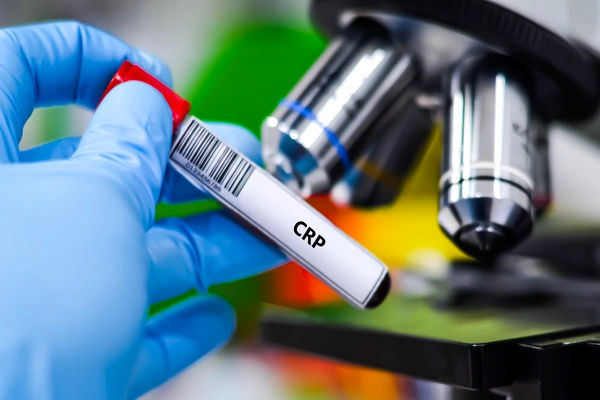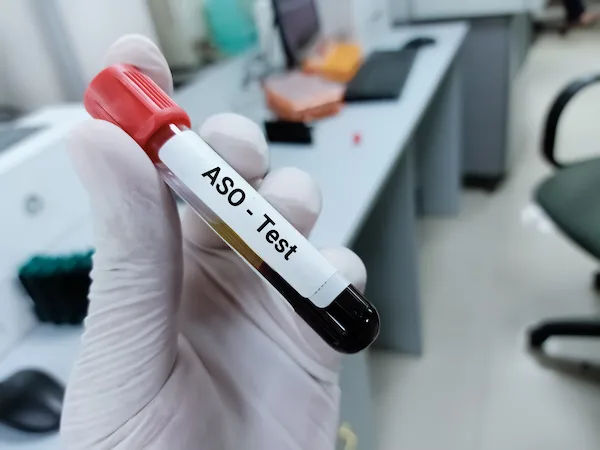HS-CRP Treatment Options And Guidelines
Elevated HS-CRP levels can indicate inflammation and heart risk. Discover treatment options and medical guidelines to manage HS-CRP through lifestyle, medication, and targeted interventions.

Written by Dr. J T Hema Pratima
Reviewed by Dr. Shaik Abdul Kalam MD (Physician)
Last updated on 20th Aug, 2025

Introduction
High-sensitivity C-reactive protein (HS-CRP) is a blood test that measures low levels of inflammation in the body. Unlike regular CRP tests, HS-CRP detects even minor inflammation, making it useful for assessing heart disease risk and other chronic conditions. If your HS-CRP levels are high, it may indicate inflammation linked to infections, autoimmune disorders, or cardiovascular diseases.
This article will help you understand HS-CRP, its significance, and the best ways to manage elevated levels.
What is HS-CRP?
HS-CRP is a protein produced by the liver in response to inflammation. While inflammation is the body’s natural defence mechanism, chronic (long-term) inflammation can harm your health. HS-CRP testing is often used to:
- Assess the risk of heart disease and stroke.
- Monitor inflammation in autoimmune diseases like rheumatoid arthritis.
- Detect infections or other inflammatory conditions.
Normal vs. High HS-CRP Levels
- Low risk (less than 1.0 mg/L): Minimal inflammation.
- Average risk (1.0 to 3.0 mg/L): Moderate inflammation.
- High risk (above 3.0 mg/L): Significant inflammation, possibly due to infection, injury, or chronic disease.
Consult Top Physicians
Causes of High HS-CRP Levels
Several factors can increase HS-CRP levels, including:
- Heart disease and atherosclerosis (hardening of arteries).
- Infections (bacterial or viral).
- Autoimmune diseases (lupus, rheumatoid arthritis).
- Obesity and metabolic syndrome.
- Smoking and excessive alcohol consumption.
- Chronic stress and poor sleep.
If your HS-CRP is high, your doctor may recommend further tests to identify the underlying cause.
Consult Top Physicians
Treatment Options for High HS-CRP
Since HS-CRP is a marker of inflammation, treatment focuses on reducing inflammation and addressing the root cause. Here are some effective approaches:
1. Medications
- Statins (e.g., atorvastatin, rosuvastatin) – Often prescribed for high cholesterol, they also help lower inflammation.
- Anti-inflammatory drugs – NSAIDs (like ibuprofen) may help in some cases, but long-term use should be monitored.
- Immunosuppressants – For autoimmune conditions like rheumatoid arthritis.
Always consult your doctor before starting any medication.
2. Lifestyle Changes
Dietary Adjustments
- Eat anti-inflammatory foods such as fatty fish (salmon, mackerel – rich in omega-3s), fruits (berries, oranges, cherries), vegetables (spinach, kale, broccoli), nuts (almonds, walnuts) and olive oil and turmeric (natural anti-inflammatory agents).
- Avoid inflammatory foods such as processed foods, sugary snacks, and sodas and excessive red meat and fried foods.
Exercise Regularly
- Moderate exercise (walking, swimming, yoga) helps reduce inflammation.
- Aim for at least 30 minutes of activity, 5 days a week.
Weight Management
- Obesity increases inflammation; losing even 5-10% of body weight can lower HS-CRP.
Quit Smoking & Limit Alcohol
- Smoking increases inflammation; quitting helps improve overall health.
- Excessive alcohol raises HS-CRP, so moderation is key.
Stress Management & Sleep
- Chronic stress elevates inflammation; try meditation, deep breathing, or hobbies.
- Poor sleep increases HS-CRP; aim for 7-8 hours of quality sleep.
When to See a Doctor?
If your HS-CRP test shows high levels, consult a doctor to:
- Rule out infections or autoimmune diseases.
- Assess heart disease risk (especially if you have diabetes, high blood pressure, or a family history of heart disease).
- Get personalised treatment plans.
Apollo 24|7 offers convenient blood tests and expert consultations. You can book an HS-CRP test or speak to a specialist for guidance.
Conclusion
High HS-CRP levels indicate inflammation, which, if left unchecked, can contribute to serious health issues. The good news is that lifestyle changes, a healthy diet, and proper medical care can significantly lower inflammation and improve overall well-being.
If you have concerns about your HS-CRP levels, don’t hesitate to seek medical advice. Early detection and management can make a big difference in your long-term health.
Consult Top Physicians
Consult Top Physicians

Dr. Rohinipriyanka Reddy
General Practitioner
9 Years • MBBS
Hyderabad
Apollo 24|7 Clinic, Hyderabad

Dr. Shaik Abdul Kalam
General Practitioner
3 Years • MD (Physician)
Visakhapatnam
Apollo 24|7 Clinic - Andhra Pradesh, Visakhapatnam
(175+ Patients)

Dr Divya Lekha Gunta
General Practitioner
10 Years • MBBS, MD (Pathology)
Visakhapatnam
Apollo 24|7 Clinic - Andhra Pradesh, Visakhapatnam

Dr. Lakshmi Sanjitha Kakani
General Physician/ Internal Medicine Specialist
6 Years • MBBS, MD (General Medicine)
Visakhapatnam
Apollo 24|7 Clinic - Andhra Pradesh, Visakhapatnam

Dr. M L Ezhilarasan
General Practitioner
6 Years • MBBS
Visakhapatnam
Apollo 24|7 Clinic - Andhra Pradesh, Visakhapatnam
Consult Top Physicians

Dr. Rohinipriyanka Reddy
General Practitioner
9 Years • MBBS
Hyderabad
Apollo 24|7 Clinic, Hyderabad

Dr. Shaik Abdul Kalam
General Practitioner
3 Years • MD (Physician)
Visakhapatnam
Apollo 24|7 Clinic - Andhra Pradesh, Visakhapatnam
(175+ Patients)

Dr Divya Lekha Gunta
General Practitioner
10 Years • MBBS, MD (Pathology)
Visakhapatnam
Apollo 24|7 Clinic - Andhra Pradesh, Visakhapatnam

Dr. Lakshmi Sanjitha Kakani
General Physician/ Internal Medicine Specialist
6 Years • MBBS, MD (General Medicine)
Visakhapatnam
Apollo 24|7 Clinic - Andhra Pradesh, Visakhapatnam

Dr. M L Ezhilarasan
General Practitioner
6 Years • MBBS
Visakhapatnam
Apollo 24|7 Clinic - Andhra Pradesh, Visakhapatnam


 (2).webp)

